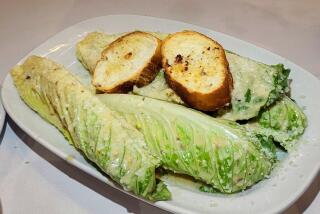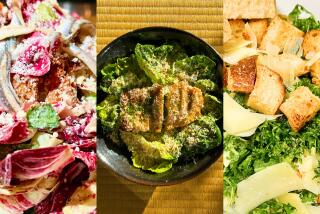Ready for a New Leaf
Dennis Gertmenian had a big problem.
His father had left town and put him in charge of the family produce business. Then the company’s biggest client called and threatened to pull his account in favor of a processor that could provide packaged ready-to-eat salads.
Terrified of what he might have to tell his father, Gertmenian promised the client he would match the service. He bought a bathtub, a butcher block, a couple of knives and some plastic bags and began washing, chopping and packing salads.
That was 30 years ago, at the less-than-grand beginning of what is now Ready Pac Inc., the nation’s third-largest producer of packaged salads and an Irwindale employer of 1,200.
Gertmenian is hoping that his early ability to adapt to the demands of the marketplace will serve him well now as he strives to keep up with two much larger competitors and drive the company forward in the next century.
With $240 million in annual sales, privately held Ready Pac is poised to grow in a rapidly expanding industry.
Total sales of prepared salads reached $1.2 billion for the year ended in September. That was an 18.5% increase over the previous year, making it one of the fastest-growing categories of supermarket foods, according to Information Resources Inc., a Chicago-based market research firm.
Gertmenian, who saw his company’s retail sales slip a bit last year even as the market advanced strongly, is determined to make Ready Pac the market leader.
So with plans for developing new products and correcting earlier missteps, the 52-year-old walks along his production lines with confidence, greeting his worker “associates” as they trim, triple-wash and pack the vegetables and fruits that he envisions in every shopper’s grocery cart.
Gertmenian and Ready Pac face stiff competition for dominance in America’s salad bowls.
Salinas-based Fresh Express Inc., the market leader, had retail sales of $460.5 million for the 52 weeks ended Sept. 13, the most recent figures available from Information Resources. That was up 22.9% from the previous year, the market research firm reported.
Fruit and vegetable giant Dole Food Co. in Westlake Village, meantime, racked up $368.8 million in retail packaged-salad sales during the same period, up 30% from the year before.
Ready Pac’s retail sales of $144.7 million for the same period were off 1.2%, according to Information Resources.
Gertmenian blames that setback on two earlier tactical errors: entering the retail market behind his two bigger competitors and packaging a salad that is arguably crisper but with a shorter shelf life than its rivals, inhibiting Ready Pac’s ability to distribute nationally.
But with packaging plants now in Irwindale and New Jersey--and contract growers up and down California--Ready Pac has expanded its distribution throughout the Western United States, the Midwest and the East Coast.
“It’s hard to serve all masters, and our focus had been food service,” Gertmenian said, noting that those accounts continue to supply about half the company’s sales.
“When we saw this industry was really going to have a great future in retail,” he says, “we decided to take a little bit different approach.”
That approach, Gertmenian discovered, had both advantages and disadvantages. Ready Pac’s process packs the lettuce with more moisture than many of the competing products, he said. “We liked the crisp effect that had, but when you pack that way, you can’t expect the product to last beyond 10 days,” Gertmenian said. “The industry is saying [they want] a 14-day shelf life.”
To that end, Ready Pac is converting some of its production lines to pack a drier product in a different type of bag. Extending the shelf life of its salads will also allow for wider distribution possibilities.
“In retrospect, we probably could have changed our packaging sooner than we did for the outlying areas,” Gertmenian said.
But he remains convinced that his original method makes for a better salad, and he will continue to ship the original Ready Pac products to local supermarkets. The company is the industry leader in Southern California, according to Information Resources.
Gertmenian also expects the consolidation of the grocery store business to add to Ready Pac’s momentum.
The big market chains are increasingly moving to prepackaged foods in place of their own back-of-the-store packaging operations for many of the same reasons restaurant chains did back when Ready Pac first began: product consistency, economy and hygiene, Gertmenian said.
He also sees opportunities to grow through acquisitions as the supermarket industry continues to shrink and as smaller, regional fresh-cut produce suppliers find themselves unable to compete.
Acquisitions, along with continued product innovation, Gertmenian believes, are key parts of a company growth strategy that he hopes will boost Ready Pac sales fivefold by 2004.
Arriving at the Irwindale plant early one morning in his gold Lexus with its “SALDMKR” license plates, Gertmenian dons hairnet and hard hat for a tour of the 11-acre facility.
His workers, bundled in heavy clothing and gloves in the refrigerated air, greet Gertmenian heartily as he surveys the production lines.
Gertmenian points out the trimmers who core the heads of lettuce and discard the outer leaves. He peers into the long, rumbling metal conveyor belts that jostle the various greens through three consecutive dunkings in near-freezing water, and then follows the soon-to-be salads as they run through a partial drying process and onto an escalator that carries them to where they are weighed and packaged in date-stamped plastic bags.
From there, it’s on to the packing room, where the salads are boxed and prepared for shipment to market, often on the same day the lettuce came in from the farm.
“Keep it clean, keep it cold, keep it moving,” one associate says of the production process.
Current production uses only about half the space in the sprawling plant. The marketing director explains that the many rooms now filled with packing materials and odd pieces of equipment are actually being held in reserve for future expansion.
The company hopes to put the extra space to use in the next few years as harried consumers turn more and more to prepackaged salads and other products.
“It’s more convenient,” said 30-year-old Shane Foley as he grabbed a Ready Pac Parisian salad mix--green-leaf and frisee lettuces, shredded carrots and radicchio--at a La Brea Avenue supermarket one night recently on his way home from work.
“I’m a bachelor and it’s easier. Just put it in a bowl and you’re ready to eat.”
(BEGIN TEXT OF INFOBOX / INFOGRAPHIC)
Salad Days
Prepackaged salads are among the fastest-growing categories of supermarket foods. Sales, in millions of dollars, for the industry leaders for the 52 weeks ended September 1997 and September 1998:
Fresh Express, Salinas
1997: $374.5
1998: $460.5
Dole Food, Westlake Village
1997: $283.5
1978: $368.8
Ready Pac, Irwindale
1997: $146.5
1998: $144.7
*
Note: Total 1997 sales were $1.04 billion vs. $1.24 billion for 1998.
Source: Information Resources
More to Read
Inside the business of entertainment
The Wide Shot brings you news, analysis and insights on everything from streaming wars to production — and what it all means for the future.
You may occasionally receive promotional content from the Los Angeles Times.










